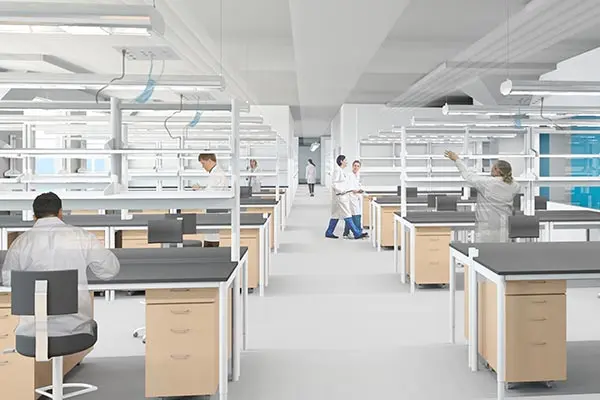Goal Is to Develop Workforce for the State’s Growing Medical Device Industry

This architectural rendering from Perkins+Will shows how the renovated lab spaces in Perry Hall on North Campus will look like when its doors open in spring 2019.
11/01/2016
By Edwin L. Aguirre
The state of Massachusetts is a leader in the medical device market, valued at $136 billion in the United States and expected to grow annually at 6.1 percent, according to the U.S. Government Accountability Office. Medical devices include artificial organs, orthopedic implants, artificial limbs, pacemakers, infusion pumps, corrective lenses, ear and dental implants, heart-lung and dialysis machines, biomedical imaging equipment and much more. In total, Massachusetts is home to more than 400 medical device companies, according to a 2011 Deloitte study, and is the second largest employer in the medical device industry, behind only California.
In support of this important sector of the country’s economy, the Francis College of Engineering has launched a biomedical engineering (BME) undergraduate bachelor’s degree program this fall, the first offered by a public university in the Commonwealth.
“The four-year program is designed to prepare students to enter the workforce for designing and manufacturing medical devices while complementing other statewide efforts in bioengineering, which currently serve the pharmaceutical and biopharmaceutical industries,” says plastics engineering Prof. Stephen McCarthy, the program’s director. It would also complement the graduate degree programs in biomedical engineering and biotechnology (BMEBT) being offered jointly by UMass campuses at Boston, Dartmouth, Lowell and Worcester.
The Class of 2020
“We have a total of 42 freshmen enrolled in BME this semester, with most of them from the Honors program,” notes McCarthy. “And half of the freshman class is female.”
He adds: “They are exceptional students — top in their classes and very enthusiastic about medical devices.”
“I chose the biomedical engineering program because I like biology and engineering,” says freshman Joshua Cote. “We’ve been learning SolidWorks, which is the program we use to make computer-aided designs. I have a strong interest in bionics, prosthetics and orthotics, so a job position at DEKA R&D Corp. back in my hometown of Manchester, N.H., is definitely something that intrigues me. I have confidence that the biomedical engineering program here at UMass Lowell would prepare me well for such a job.”
His classmate, Aisling McEleney of Atkinson, N.H., agrees. “I decided to come to UMass Lowell because of the success this university has had in teaching other engineering disciplines. I trust that the biomedical engineering program here will end up being just as well-renowned and respected as the university’s plastics, mechanical, civil, chemical, electrical and computer engineering programs.”
She adds: “I’ve also started working with eNABLE Lowell, an on-campus group supported by the DifferenceMaker that designs and creates 3D-printed prosthetic devices for kids who are in need of artificial upper limbs. Working with the group has been such a fantastic experience because the whole team has been so friendly and willing to teach. Through them I have gotten, and will continue, to learn a lot about 3D printing, laser cutting and the prosthetic design process.”
“Large companies that sponsor M2D2 are very excited to have future biomedical engineers focus on medical devices,” says McCarthy, who directs M2D2. “One way to teach students about medical devices will be through internships with these companies at M2D2. Every freshman has expressed interest in doing internships next summer.”
The BME program incorporates coursework traditionally affiliated with the medical field (biology, anatomy and physiology, biomechanics) and business (economics, statistics, entrepreneurship) while maintaining the rigors of a traditional engineering program (statics, dynamics, circuits, design, etc.). Two senior biomedical capstone projects are also required.
“At capacity, the program is expected to produce about 100 graduates annually, ready to join the workforce or pursue advanced educational opportunities,” says McCarthy.
Perry Hall Renovation
A Department of Biomedical Engineering has been proposed, which will be housed at Perry Hall on North Campus. The four-story building, which first opened in 1952, is scheduled to undergo major interior and exterior renovation starting next year. A total of nearly 12,000 square feet of brand-new research and teaching labs, offices and common collaborative spaces has been designated for BME workforce development. The shared spaces will allow students to interact directly with representatives from industry, government and academia, so they can work on projects alongside visiting engineers and scientists.
The renovation project is expected to cost $48 million. The university hopes to raise the remainder from external sources, including corporate partners and the Massachusetts Life Sciences Center. The Boston architectural firm Perkins+Will has developed the preliminary plans for Perry’s modernization. Once completed in 2019, the new Perry Hall will serve as integrated center for the university’s leading engineering initiatives, not only in biomedical engineering but also in biomanufacturing, clean energy and environmental engineering.
